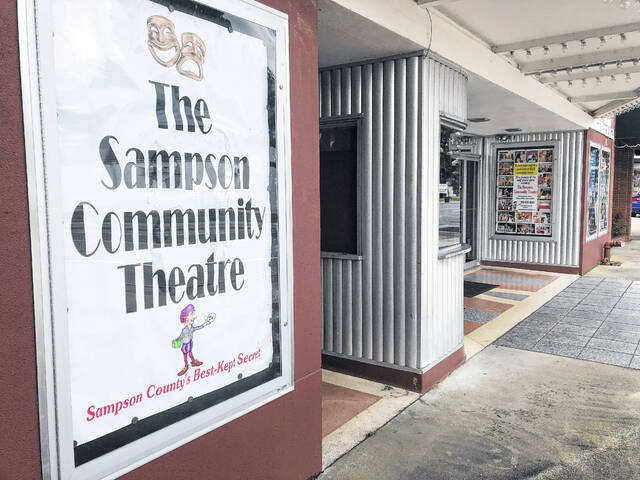
The Clinton City Council approved resolutions to negotiate with engineering and architectural firms as part of a sizable $350,000 facelift at Sampson Community Theatre.
Steps taken to move $350k theater project forward
A transformative state grant award last year set the stage for a much-needed facelift for the historic Sampson Community Theatre in downtown Clinton, and now City of Clinton officials are moving forward to see the curtain rise on the project.
At a recent meeting, the Clinton City Council approved resolutions designating City Manager J.P. Duncan the authority to negotiate a contract with The Wooten Company for administrative services and a contract with Maurer Architecture for architecture and engineering services for the implementation of a Rural Transformation Grant for the project entitled “The Show Must Go On.”
The Wooten Company will perform the professional services associated with the grant implementation including administration, bidding and construction project documents, as well as permitting of the project, in accordance with all applicable regulations and standards. Maurer will be responsible for architectural/engineered drawings necessary to complete the project.
The project, aptly entitled “The Show Must Go On, Revitalizing Clinton’s Historic Theatre,” was awarded $350,000 from the North Carolina Department of Commerce last summer to rehabilitate the theater, located at 115 Fayetteville St.
That renovation will include balcony and façade improvements, the restoration of two window openings, and the removal and historically accurate replacement of the marquee hip roof, all of which will result in preserving the theater’s historic character, project leaders have said.
“We are looking forward to this transformative project in Downtown Clinton,” Clinton Planning and Development director Mary Rose has said.
The award was announced in June 2023 as part of a round of grant funding in which a total of 29 local governments in rural areas across North Carolina garnered grants from the Rural Transformation Grant Fund, a robust source of support for rural economic development projects in North Carolina.
A total of $8 million was issued as part of a third round of grantmaking from the fund, which helps local governments overcome challenges that limit their economic competitiveness. The N.C. Department of Commerce and its Rural Economic Development Division administers the fund.
“These transformative grants can make a real difference in rural communities by reviving downtowns and strengthening neighborhoods,” Gov. Roy Cooper stated. “These funds, with the support of our rural development team at the Department of Commerce, will bring more economic opportunity to people across the state.”
The Rural Transformation Grant Fund, the centerpiece of a broader Rural Engagement and Investment Program from Commerce, addresses a wide variety of needs, from revitalizing downtown districts, building the capacity of local government staffs, revitalizing neighborhoods, fostering small business recovery, and generally supporting economic growth initiatives.
The City of Clinton was included in the Downtown Revitalization category, which supports downtown development initiatives that help grow and leverage a community’s commercial core into an asset for economic growth and prosperity.
“This is a great opportunity to continue the work completed in partnership with the Sampson Community Theater non-profit in 2021 when the city and non-profit shared in the cost of renovating the theater lobby and restrooms,” Rose said upon the city receiving the grant. “This next phase will focus moving restoration efforts into the balcony and facade improvements.”
Sampson Community Theatre has traditionally sought to put on about half a dozen productions a year to a roughly 300-capacity audience, entertaining thousands a year.
The Rural Transformation Grant Fund, established in March of last year, has now awarded its total available funds of $48 million. In that time, even greater community needs were identified, as local jurisdictions submitted for consideration projects totaling $165 million. In this third round of grantmaking, Commerce received project applications totaling $44 million, and therefore could not meet the entire demand, given the available funding.
“The need in our rural communities is great, but I’m pleased we’ve been able to meet some of these needs with this transformative grant program,” said North Carolina Commerce Secretary Machelle Baker Sanders. “I’m proud of the program’s strong track record of success, managed by Commerce’s experienced rural development team and grounded in tried-and-true best practices that we know work well.”
“These economic development grants will bring new vitality to many rural communities,” added Kenny Flowers, the Commerce Department’s Assistant Secretary for Rural Economic Development. “I look forward to working with these communities as we work to transform the economy in rural North Carolina.”
Editor Chris Berendt can be reached at 910-592-8137 ext. 2587.
